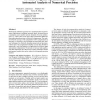Free Online Productivity Tools
i2Speak
i2Symbol
i2OCR
iTex2Img
iWeb2Print
iWeb2Shot
i2Type
iPdf2Split
iPdf2Merge
i2Bopomofo
i2Arabic
i2Style
i2Image
i2PDF
iLatex2Rtf
Sci2ools
130
click to vote
CGO
2010
IEEE
2010
IEEE
Towards program optimization through automated analysis of numerical precision
Reducing the arithmetic precision of a computation has real performance implications, including increased speed, decreased power consumption, and a smaller memory footprint. For some architectures, e.g., GPUs, there can be such a large performance difference that using reduced precision is effectively a requirement. The tradeoff is that the accuracy of the computation will be compromised. In this paper we describe a proof assistant and associated static analysis techniques for efficiently bounding numerical and precisionrelated errors. The programmer/compiler can use these bounds to numerically verify and optimize an application for different input and machine configurations. We present several case study applications that demonstrate the effectiveness of these techniques and the performance benefits that can be achieved with rigorous precision analysis. Categories and Subject Descriptors D.2.4 [Software Engineering]: Program Verification–Validation; D.3.4 [Programming Lan
CGO 2010 | Large Performance Difference | Real Performance Implications | Smaller Memory Footprint | Software Engineering |
| Added | 16 May 2010 |
| Updated | 16 May 2010 |
| Type | Conference |
| Year | 2010 |
| Where | CGO |
| Authors | Michael D. Linderman, Matthew Ho, David L. Dill, Teresa H. Y. Meng, Garry P. Nolan |
Comments (0)

